Your diet is one of the most effective ways to control your blood pressure. Eating better can help with weight loss, reduce the intake of nutrients that cause high blood pressure, and increase the intake of nutrients that help with lowering blood pressure.
You should strive to maintain normal blood pressure as hypertension can have many ill effects on your body. Fortunately, a healthy diet can make that easier. Some fruits can help lower blood pressure, so they deserve a place in your daily life.
This guide will show you 14 fruits that lower high blood pressure naturally.
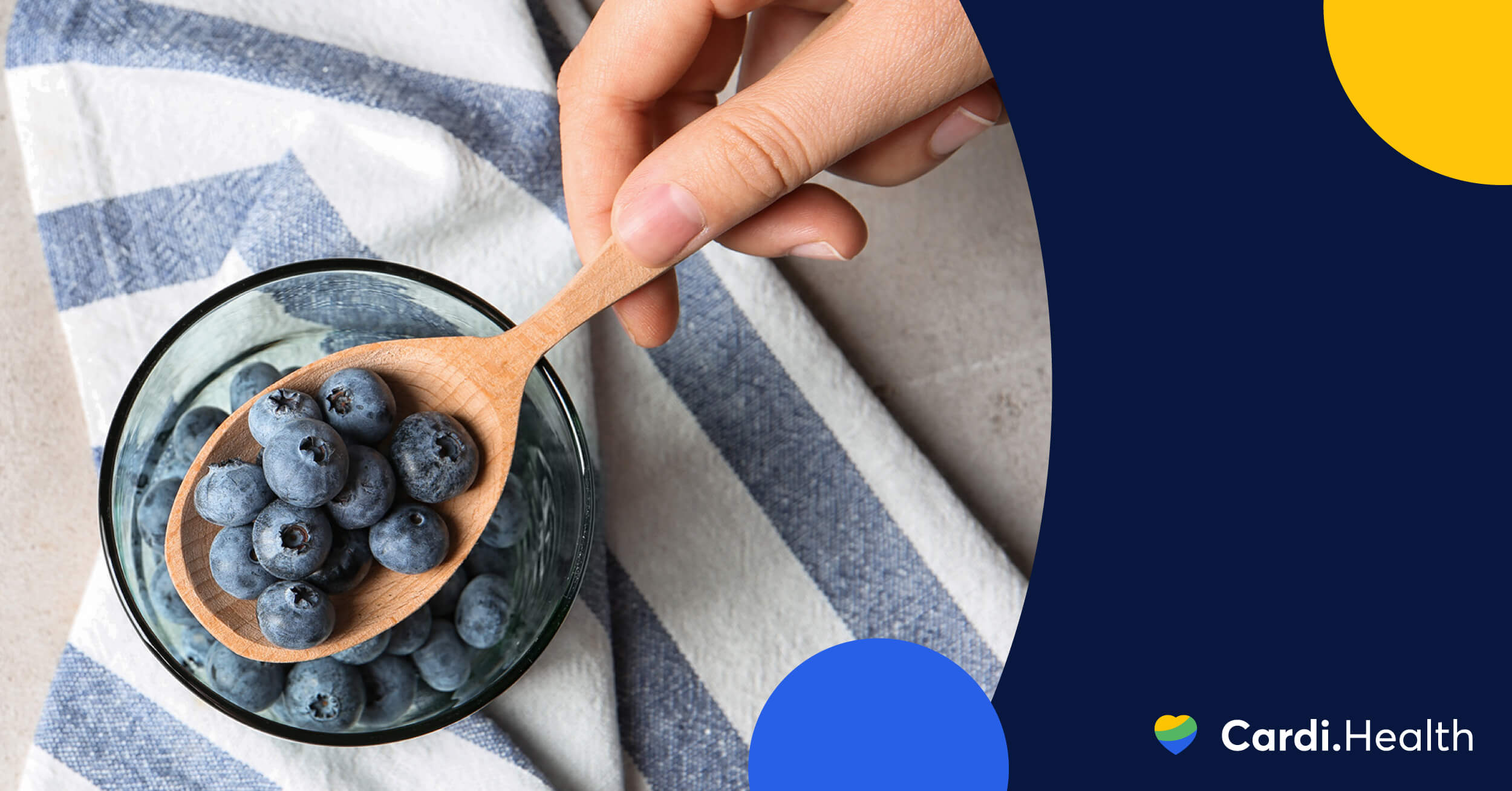
Master your heart health now
Take part in our 60sec quiz and get a heart health plan tailored just for you.
Contents
1. Bananas
Bananas are famous for how potassium-rich they are. A single medium-sized banana can contain as much as 450mg of potassium. On top of that, they’re great sources of other nutrients like vitamin B6, vitamin C, and magnesium.
Potassium is very beneficial for heart health as it counteracts the effects of sodium and effectively helps lower blood pressure.
2. Oranges
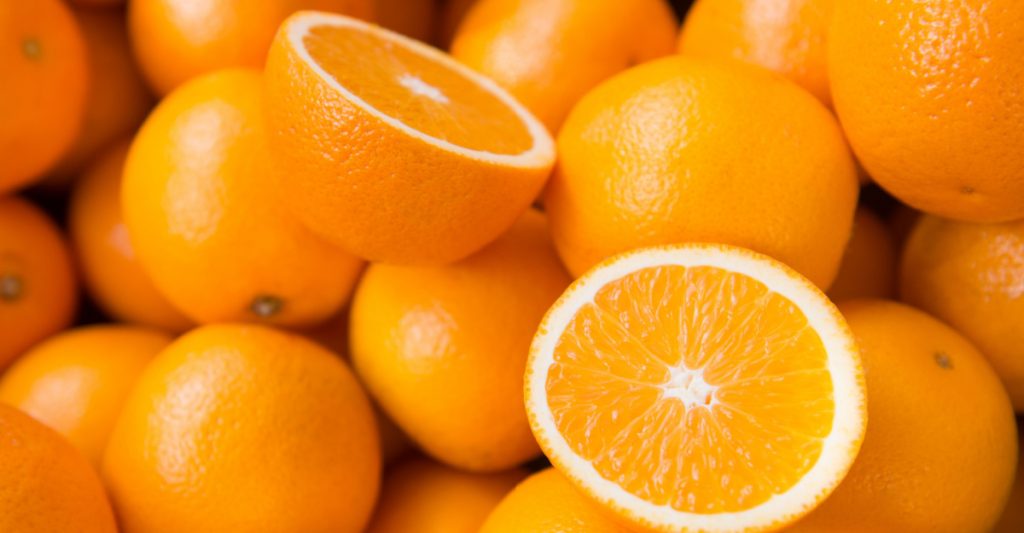
Oranges are a fruit that can be found everywhere, at any time, almost anywhere in the world. They’re rich in vitamin C, folate, and fiber, as well as flavonoids.
A study found that drinking orange juice made from concentrate twice a day for as little as 4 weeks could lower blood pressure to a significant extent. At the same time, it’s known that vitamin C can help reduce high blood pressure.
3. Watermelon
Another fruit that can help lower high blood pressure is watermelon. Watermelon has a lot of vitamin C and potassium, which like earlier mentioned, can both be beneficial for lowering blood pressure.
One study was able to show that watermelon extract can directly lower both systolic and diastolic blood pressure in patients with high blood pressure.
4. Pomegranates
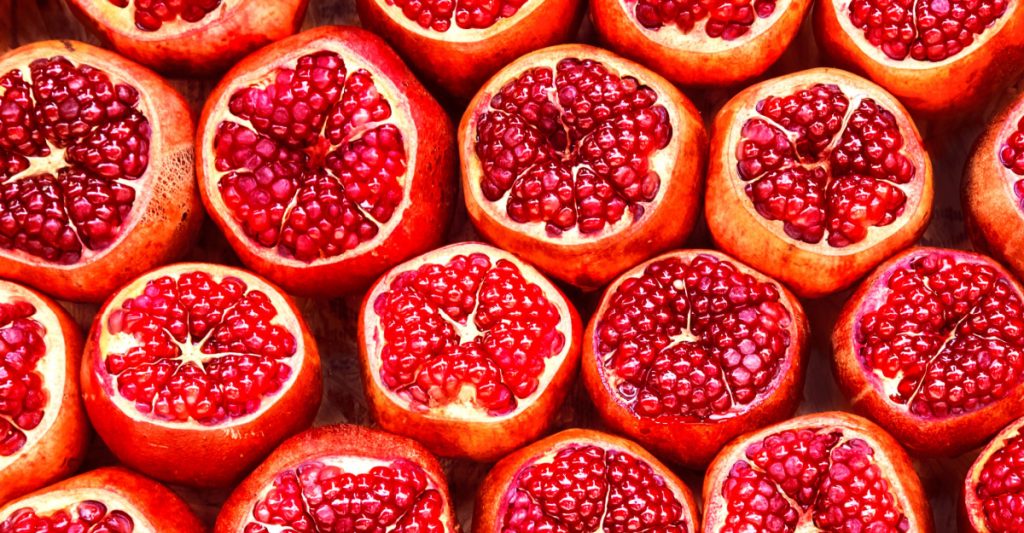
Pomegranates are particularly rich in potassium and polyphenols (which are basically antioxidants). So, not only are they delicious, but they can serve as a great source of nutrients that can contribute to your heart health.
Systolic and diastolic blood pressure can be lowered by consuming pomegranate products like peels, seed oil, extract, and juice, even in amounts of as little as 150 milliliters a day.
5. Apples
“An apple a day keeps the doctor away,” and if you’re trying to manage high blood pressure, that certainly remains true. Apples have plenty of fiber, vitamin C, and phytochemicals, including flavonoids.
Apples were shown to lower blood pressure, though this effect was only seen on systolic pressure and not diastolic. This benefit can be obtained from whole apples, purees, juices, and so on.
6. Avocados
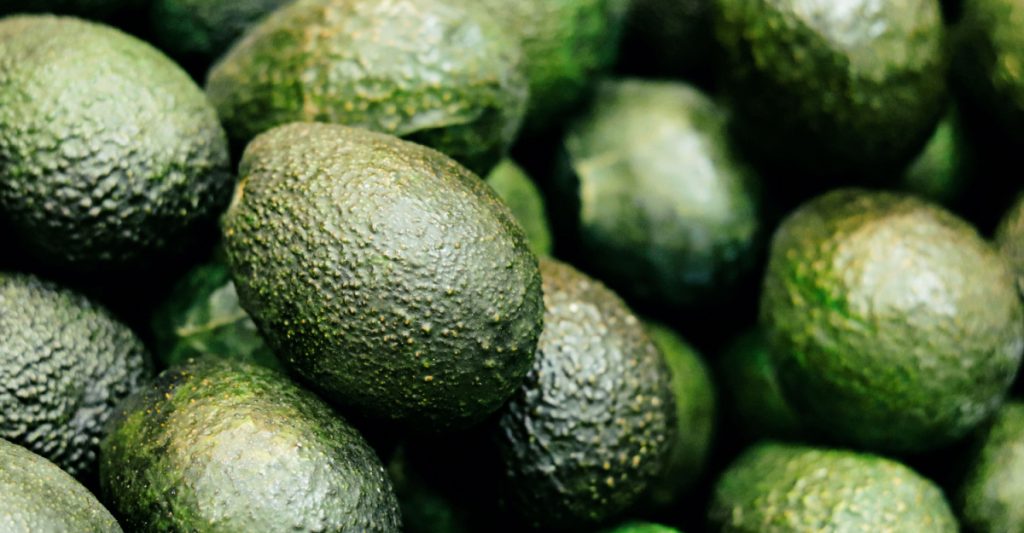
In recent years, the popularity of avocados has risen significantly (to the point where there was a notable avocado shortage!). This is thanks to their versatility in dishes, unique flavor, and health benefits.
Avocados are fatty fruits, but they are full of monounsaturated fats (also called healthy fats), which are good for your heart health. They also fall perfectly into a healthy diet since they are rich in B, C, E, and K vitamins, fiber, potassium, and carotenoids.
If you’re hoping to manage high blood pressure with fruits, then you’ll be glad to know that avocados have been shown to be useful in treating hypertension.
Start managing your heart health now!
Find out what works for you with this 60sec quiz.

7. Kiwi
Kiwis are a fruit that is very nutritious and just as delicious. They have high amounts of vitamin C, vitamin E, potassium, fiber, and folate. This doesn’t just make them great for snacking on but also means they integrate well into a healthy diet.
Studies have looked into how kiwi can help manage high blood pressure. It was shown that eating 3 kiwis a day for 8 weeks was able to drop systolic blood pressure by 10 points and diastolic by 9.
8. Grapes
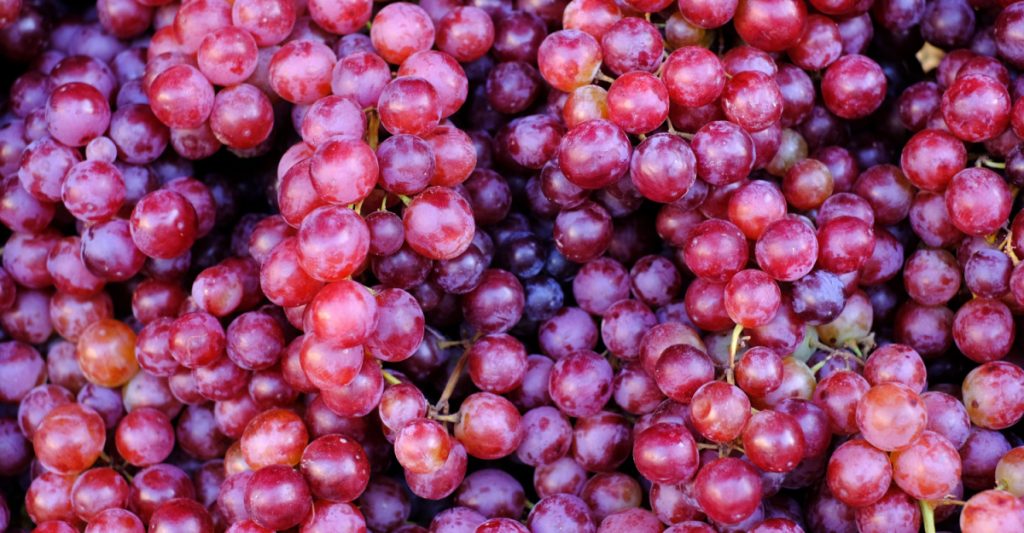
Whether straight off the branch or in the form of juice, almost everyone loves grapes. They’re a convenient fruit to eat, with high water content, lots of fiber, potassium, antioxidants, and other nutrients. Grapes are one of the tastiest foods that lower blood pressure.
In particular, a polyphenol called resveratrol has been shown to be heart-healthy, and one of its effects is lowering the risk of fatty deposits in blood vessels as well as reducing blood pressure.
9. Pineapple
A pineapple is one of the sweetest fruits many have had, making it a favorite. Compared to other fruits, it takes quite a bit of peeling before you can eat one, but it is worth it. They are a good source of fiber, vitamin C, calcium, and potassium. However, try to avoid canned pineapple because there tends to be added sugar.
Pineapple can reduce high blood pressure. While pineapple has ample vitamin C and potassium, which are important in regulating blood pressure levels, a study found that they also have copper, which helps keep blood pressure and heart rate normalized.
10. Papaya
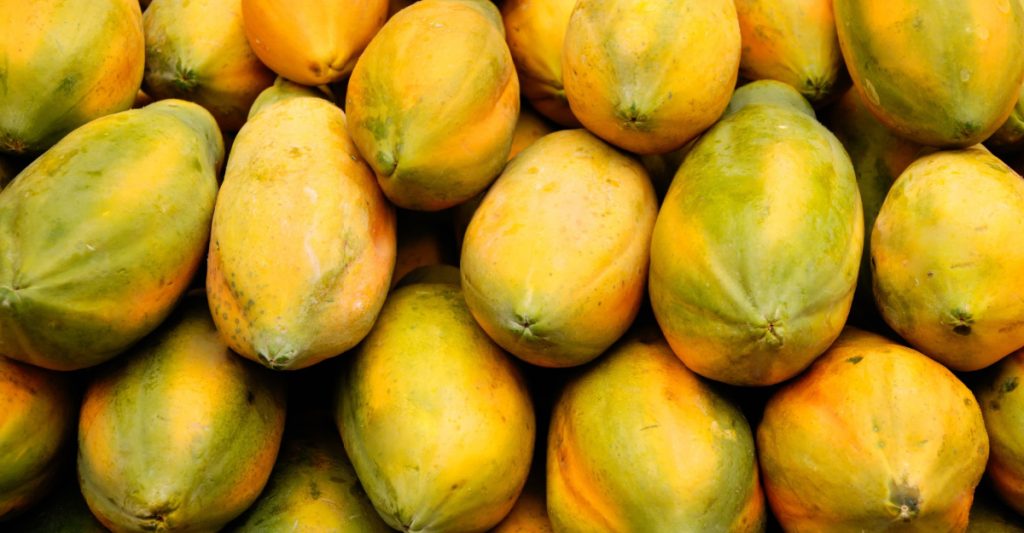
Papaya is a tropical fruit, so if you live in a temperate region, you might not see too many of them. Despite this, they’re great fruits to incorporate into your diet to help lower blood pressure. They contain a lot of flavonoids, vitamins, and minerals that can help with this.
Although there aren’t many human studies showing how papayas can help lower blood pressure levels, there have been animal studies showing this.
11. Mangoes
Mangoes are tropical fruit, and anyone who’s had one has likely fallen in love with their juicy, exotic flavor. Nutritionally, these are fantastic. A whole mango can provide 100% of your daily vitamin C intake and a significant amount of other vitamins and minerals like copper.
Besides their amazing taste, mangoes can help lower blood pressure levels. Not only were these fruits able to reduce systolic blood pressure, but they even had a positive effect on glucose control.
12. Guava
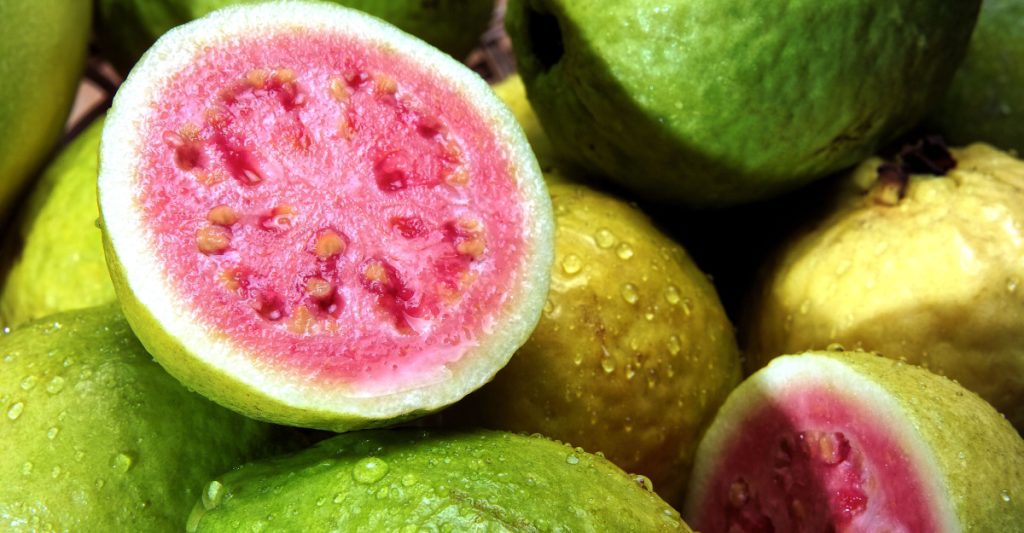
You might not have seen or eaten guava before, but if you’re trying to manage high blood pressure levels or just stay healthy, this fruit is amazing. They don’t get much publicity, but one guava has 100% of your daily vitamin C intake (and more than an orange).
13. Apricots
To lower blood pressure, apricots are a great choice. These sweet fruits are full of potassium, which helps combat the negative effect that sodium can have when it comes to blood pressure. One apricot can have about 260mg of potassium!
There’s still research that needs to be done to see how apricots can directly lower blood pressure, but it is clear that they are great fruits if you want something that can protect your heart, liver, and other parts of your body.
14. Peaches
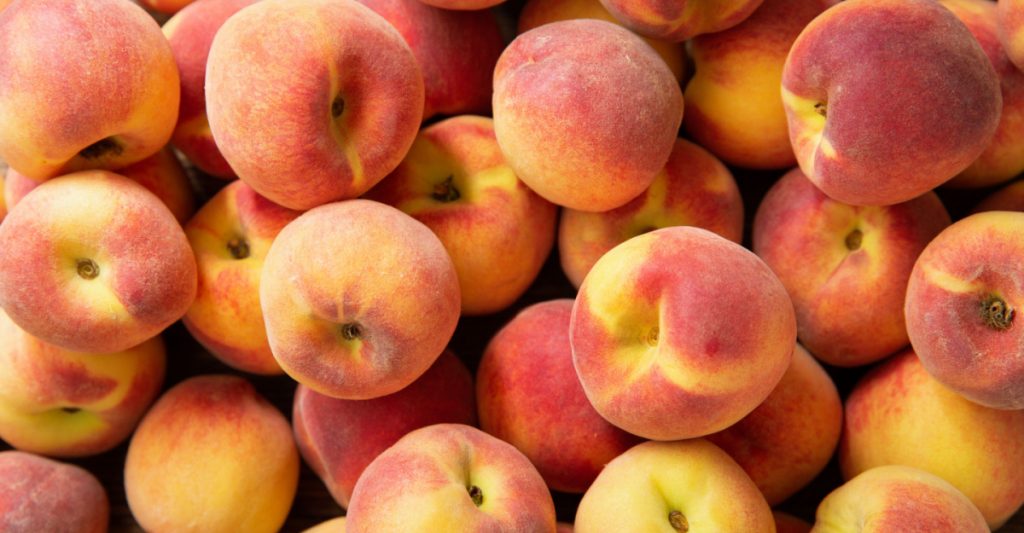
Did you know that one medium peach contains plenty of potassium and more than 15% of your recommended daily vitamin C intake? Plus, they are low in calories and have many other vitamins and minerals.
Since peaches are delicious, it is straightforward to add them to your diet. All that potassium and vitamin C makes them a great choice for people with high blood pressure.
The Role of Fruits in Lowering Blood Pressure
When you want to lower blood pressure by changing your diet, fruits are an effective place to start. Fruits that lower blood pressure tend to be rich in vitamins, minerals, and other nutrients that can help you manage your blood pressure. Below are some of these:
- Potassium: This mineral increases blood flow to your tissues and has also been proven to lower blood pressure.
- Vitamin C: If you have high blood pressure, supplementing your diet with vitamin C, which you can get from fruits, can lower your blood pressure.
- Polyphenols (flavonoids): Polyphenols are compounds that come in many forms, including flavonoids. There are many kinds, but several have been found to have positive effects on blood pressure.
- Fiber: Although the mechanism isn’t certain, it is clear that getting more fiber in your diet can help tackle high blood pressure. The same study showed that these patients needed fewer blood pressure medications.
Keep in mind that different fruits are rich in different nutrients. Guavas have more vitamin C than oranges, but bananas have a lot more potassium than other fruits. Incorporate a variety of fruits into your diet, and not just one or two.
Incorporating Fruits Into Your Diet
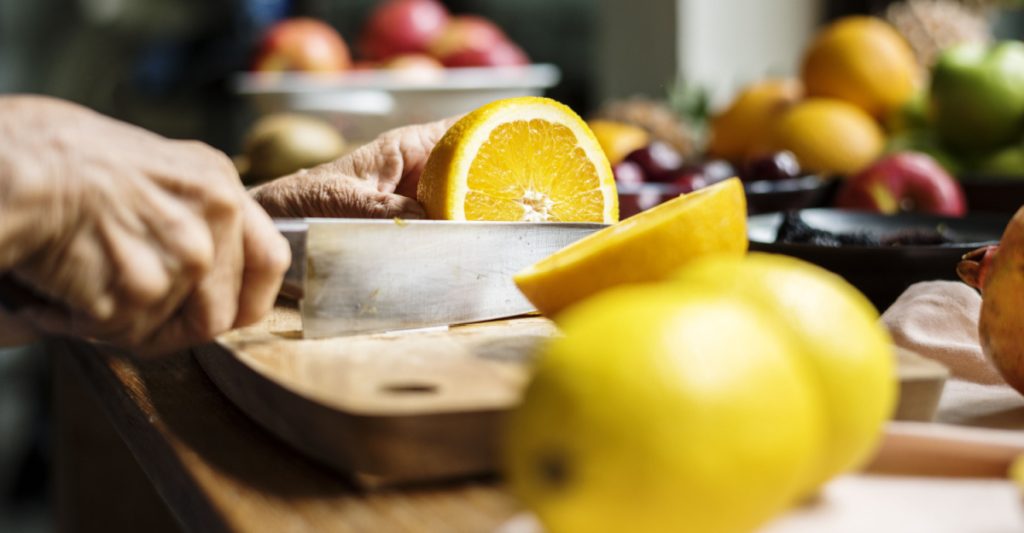
It’s clear that getting more fruits in your diet can help lower blood pressure, but it can be hard actually integrating them into your diet.
Fortunately, there are many ways you can add fruits to your meals.
- Smoothies are easy to consume. You can take them to work with you, and they’re a lot more convenient to have with you. Plus, you can mix different fruits into one drink for a better effect on your blood pressure.
- Cut slices or cubes of fruits like bananas, apples, watermelons, mangoes, and pineapples. Store them in your fridge and snack on them. You can even mix these fruits for a fruit salad.
- Simply eat a whole fruit of any kind with each meal of the day. It could be a banana, an apple, an orange, and so on. Make it a habit.
- Fruits can go directly into some breakfasts, like with oatmeal, cereal, and yogurt. You can help lower blood pressure with any meal of the day.
- Skip jam and syrup and make fruit purees instead, using peaches, apples, mangoes, etc.
However, as much as you want to manage high blood pressure with fruits, note that eating a lot is bound to have an effect on your blood sugar, even if transient. Make sure to keep your portions healthy.
Other Dietary and Lifestyle Modifications for High Blood Pressure Control
There are other measures you can adopt in your diet and lifestyle to control high blood pressure beyond fruits. Here are some of the most effective:
- A healthy, balanced diet: This article has shown how the nutrients in fruits can help, but there are many other aspects to a diet. You’ll want a balanced diet with enough carbs, protein, and healthy fats. At the same time, you want to avoid unhealthy elements like processed foods, added sugars, saturated and trans fats, and too much sodium. All of these can contribute to increased blood pressure.
- Increased physical activity: Keeping active can directly reduce your blood pressure, and since it can help with weight loss, that helps more! Aim for about 150 minutes of moderate activity each week.
- Stress management: Stressful situations can get your heart pumping and your blood pressure up. Whether it is from work, school, or life, stress can negatively impact BP, and managing stress well is essential.
Evidently, there’s a lot that goes into managing hypertension effectively. However, using the Cardi Heart app, you can make meal planning, exercise routines, and BP management so much easier.
Start managing your heart health now!
Find out what works for you with this 60sec quiz.

FAQ
Which fruits are best for managing blood pressure?
Bananas, oranges, watermelons, pomegranates, and apples are among the 14 fruits highlighted that can help lower blood pressure due to their rich nutrient content.
How do fruits help lower blood pressure?
Fruits often contain key nutrients like potassium, vitamin C, polyphenols, and fiber, which have been proven to have positive effects on blood pressure.
Can I only eat fruits to manage my blood pressure?
While fruits are beneficial, it’s essential to maintain a balanced diet and consider other dietary and lifestyle modifications for effective blood pressure control.
Is there a risk of consuming too many fruits?
Yes, consuming a lot of fruits can impact your blood sugar levels, so it’s crucial to keep your portions healthy.
Final Considerations
Fruits can be a tasty and healthy way to keep your blood pressure under control. Whether you’re eating apples, mangoes, bananas, guavas, or pineapples, nutrients like potassium, vitamin C, fiber, and polyphenols can help manage your BP.
However, remember that as you eat more fruits, you should maintain a balanced diet and avoid the negative impact that saturated fat, sodium, and added sugar can have.
Related articles
Best Foods to Lower Cholesterol
Does Caffeine Raise Blood Pressure?
Does Drinking Water Lower Blood Pressure?
Causes of High Blood Pressure at Night
10 DASH Diet Breakfasts for a Healthy Start
Heart-Healthy Diet Guide
What Should an 85-Year-Old Blood Pressure Be?
What is Normal Blood Pressure for a 70-Year-Old?
How to Read Blood Pressure: A Comprehensive Guide
Manage your heart health now
Find out what works best for you with this 60sec quiz and get your personalized heart health plan.

